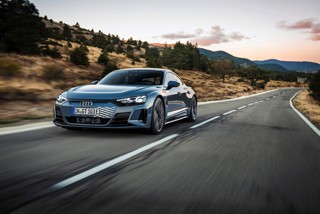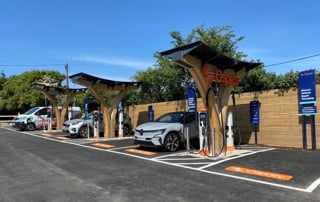Ultra-rapid charge points are proving popular with usage increasing five-fold over the past year, according to a new report from Zap-Map.
In 2020, it found that 16% of electric vehicle (EV) drivers used ultra-rapid chargers, up from 3% the year before.
Over the past 12 months, the roll-out of these charge points has been stepped up significantly, with 788 ultra-rapid chargers now installed across the country, up from 476 at the end of 2019.
The average charge time from an ultra-rapid charger is half that of a standard 50-kilowatt rapid charger, with the majority of the latest EV models such as VW ID range, Jaguar I-Pace, Tesla Model 3, Hyundai Kona and Vauxhall Corsa-e, able to take advantage of these higher charge speeds.
Zap-Map also found that the 50-kilowatt rapid chargers remain the most popular - 64% of respondents use these devices which can add 100 miles of range in around 25 mins.
Dr Ben Lane, co-founder and chief technical officer at Zap-Map, said: “This new report comes at a crucial time for the EV market.
“Competition among car manufacturers and charge point operators is becoming fierce and the industry is growing fast. The insights in this year’s wide-ranging report show that EV drivers are adapting to changes in the market.
“One of the clear conclusions is the importance of having a robust and reliable charging network. As the number of EVs continues its upward march, it’s vital that drivers are offered the simplest and smoothest experience possible.”
The Zap-Map report, which surveyed 2,200 EV drivers, also showed how drivers are now using the public network.
The survey found that while 83% of EV drivers regularly charge at home, 90% also use the public charging network, with 39% using the public network at least once a week.
This overall usage has fallen from the 2019 figure of 94%, most likely due to the impact of the coronavirus pandemic on driving patterns and car usage.
In addition, over 48% of respondents now charge at supermarkets, closely followed by motorway service stations (47%) and public car parks (32%).
In previous years, motorway service stations have been the most popular location types.
It is thought that the increase in the number of charge points available at supermarkets – now standing at 1631 chargers in 952 locations – combined with the availability of free charging at some of the major chains are driving this shift.
Other key findings from the report include: a new top 16 ranking of charging networks based on driver satisfaction. less than 1% want a return to petrol or diesel; and growing issues around accessibility for disabled users.
EV adoption rates surge
The Zap-Map report is published as pure EVs surged to take a 15% share of new lease car registrations in the third quarter of 2020
According to the BVRLA’s latest Quarterly Leasing Survey, plug-in and hybrid vehicles overtook diesel in gaining a 36% share of new lease car registrations during the same period and look set to overtake petrol very soon.
Nearly one-fifth of the BVRLA car leasing fleet now relies on some form of powertrain electrification as the fleet sector continues to drive the transition to cleaner road transport.
Diesel’s share of the total lease car market fell below 50% for the first time, while petrol held steady with a 34% share.
Average CO2 emissions for BVRLA car leasing fleet new registrations fell from 107g/km to 105g/km in Q3-2020, a new low and around 8% lower than the national average.
The car leasing market, excluding PCP and Motability vehicles, saw its fleet shrink by 6%, with the biggest reduction seen in the business fleet, down 8.7% year-on-year.
This decline was driven by an 11% fall in the business contract hire fleet compared to the same period of 2019. These fleet size declines were partially offset by an increase in the consumer leasing fleet, which was up 4% year-on-year.
The LCV lease fleet continued to increase in Q3, albeit at a slower rate of 1.1% year-on-year, following two consecutive quarters of a 2.1% growth.
“Quarter three of last year delivered the long-awaited surge in BEV registrations that we expected after the introduction of the zero-rate BiK incentive,” said BVRLA chief executive, Gerry Keaney.
“A massive 21% of new business contract hire car registrations were BEVs, once again demonstrating that the company car sector is driving the transition to zero emission motoring.”
Salary sacrifice searches increase
Using Google data, research from Tesla online valuation website ‘We Love Tesla’ identified an increase in the number of drivers searching for EV charging facilities while on the move.
Local searches for ‘Electric Chargers Near Me’ increased by 2,850% between January 2020 and January 2021.
Consumers and businesses also seem to be considering making their premises more EV-friendly, with a 350% increase in searches for EV charging installations made during the same period, and a 250% increase for homeowners searching for EV charging at home.
Chris Davies, founder of We Love Tesla, said: “Brands such as Tesla were formed with the intention to show people that they do not need to compromise to drive electric, and that electric cars can be more sustainable, economical and fun to drive.”
We Love Tesla research also showed an increase in search for salary sacrifice schemes (up 550%) in 2020.
Alongside searches for ‘electric cars 2021 UK’, and ‘upcoming electric cars’ up 1,450% and 200% respectively, the data used for this research suggests that over the next 12 months we will continue to see a rise in the number of drivers considering making the switch to EV, says We Love Tesla.
The 50-page Zap-Map report, which includes 40 data slides, is available in PDF format, and is supplied under a single organisation (or individual) licence for in-house use only.
A summary report is available to download for free while the full report is available at an introductory price of £530+VAT (a 33% discount for the first 25 reports sold) and thereafter at the standard price of £795+VAT.
The EV Charging Survey Report is available here. To claim the 33% discount apply the code ZAPMAP33 during checkout.






















Login to comment
Comments
No comments have been made yet.